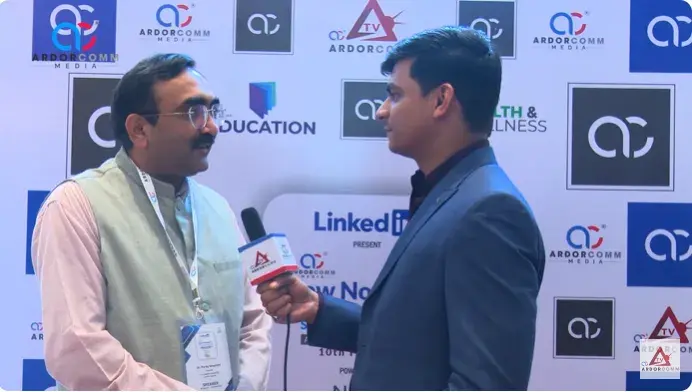ArdorComm Media Bureau
February 26, 2024
“The NEP is urging universities to be more flexible” said Dr. Parag Sanghani, Provost, P. P. Savani University, Surat at ArdorComm Media Group hosted ‘New Normal – Education Leadership Summit & Awards 2024’ on 10th February 2024 at Crowne Plaza Ahmedabad City Centre, Ahmedabad, Gujarat.
How will technology like AI make the student market ready to grab their desired goals?
The whole world is changing because of technology, the way generative AI is transforming every field where we live today, the way the internet is shaping our lives in the early 21st century. Machine learning and deep learning will change how we educate our students. I would say that knowledge has been democratized, now students don’t necessarily come to universities solely to acquire knowledge. There are numerous technological advancements through which they can access knowledge. Today, if you want any courses for free, they’re available online, with materials accessible freely. However, universities still play a vital role in teaching students how to use this technology and how to incorporate it into their lives. More importantly, universities play a role in what we call character building, where their role shifts from merely imparting information to teaching students how to apply that knowledge. This transformation is underway, and that’s where my university, P.P. Savani University, is focusing more of its attention.
What steps are suggested by the new education policy to change the dynamics of the education system?
I would say it’s flexibility. The NEP is urging universities to be more flexible. Students can enrol and exit anytime, and if they don’t like a course, they can bank the credits for future use. The major focus is on the indianisation of education, with the NEP emphasizing it, and P.P. Savani University is focusing on the indianisation of higher education. We emphasize “Sanskar-Sathya-Shiksham,” which means character building, nurturing humans rather than machines. Our curriculum places a strong emphasis on social consciousness, building character alongside imparting knowledge.
How will AI and technology impact the overall education culture in India?
It will truly transform education. Universities will become social hubs where people come together to collaborate, enhancing social interaction and consciousness. Universities will help individuals learn how to live and coexist with technology and others. AI and technology will assist in data management and information retrieval, but it will be up to universities to teach students how to apply this information effectively. The entire university environment will become more flexible, offering plug-and-play opportunities. Universities will focus not just on imparting information and knowledge but also on teaching students how to apply this knowledge, how to build organizations and institutions. Currently, around 80-70% of education focuses on information and knowledge, while only about 30% focuses on skills. In the future, the focus will shift towards the heart and hands, with technology taking care of the head.
What was your overall takeaway from this event?
It’s great to bring the community together, providing more opportunities for interaction and networking among academics. If we can have more events like this, it will always be beneficial. I truly appreciate ArdorComm Media for their remarkable impact within just 2 years. They have brought together the right people in academia, technology partners, and content providers. Their growth has been impressive, and they have made a significant impact on every community they’ve engaged with.


